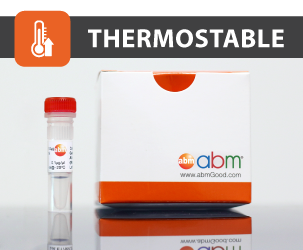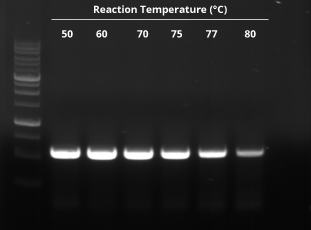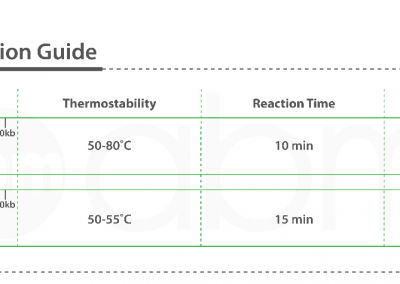Specifications
| Description |
OneScript® Hot Reverse Transcriptase is a mutational derivative of Moloney-Murine Leukemia Virus Reverse Transcriptase, that can reverse transcribe low abundance or degraded RNA, and has significantly better resistance to contaminating inhibitors such as reagents used during RNA extraction and contaminants from biological samples. High processivity and sensitivity allow for rapid cDNA synthesis of full-length cDNA fragments in a fraction of the time of leading competitors. abm is the only company in the world to have a reverse transcriptase engineered to offer superior cDNA synthesis performance with even the most challenging RNA samples due to its incredible thermostability at 60-72ºC. This is the enzyme of choice for daily or demanding RNA reverse transcription.
|
||||||
|---|---|---|---|---|---|---|---|
| SKU | G593 | ||||||
| Storage Condition |
Store at -20ºC. |
||||||
| Unit quantity | 100 rxn |
OneScript® Hot Reverse Transcriptase
Synthesize cDNA from complex RNA templates with abm’s OneScript® Hot Reverse Transcriptase. Engineered for outstanding thermostability, our OneScript® Hot Reverse Transcriptase is ideal for handling secondary structures (e.g. GC-rich templates) as well as long, degraded, or contaminated RNA samples, making it the superior choice for challenging RNA templates.

![]()
Extreme thermostability At 50-80°C
![]()
Transcribes degraded samples and resists inhibitors/contaminants
![]()
High cDNA yields from difficult or ultra-low RNA samples
Outstanding Thermostability

OneScript® Hot Reverse Transcriptase has exceptional thermostability. OneScript® Hot Reverse Transcriptase (Cat. No. G593) was used in a 10 min. reaction with RNA template at temperatures ranging from 50 and 80˚C. The resulting synthesized cDNA was followed by PCR and visualized on a 1% agarose gel.
Documents
FAQs
References
- Lee, G et al. “Potential monoclonal antibody therapy for the treatment of ovarian cancer” Ovarian cancer—basic science perspective :385-406 (2012). DOI: 10.5772/1268 . Application: Reverse Transcription.
- Wu, F., Niu, Z., Zhou, B., Li, P., & Qian, F. “PSMB1 Negatively Regulates the Innate Antiviral Immunity by Facilitating Degradation of IKK-ε” Viruses 11(2):99 (2019). DOI: 10.3390/v11020099.
- Zhao, G., Zhang, T., Sun, H. J., & Liu, J. “Copper nanoparticles induce zebrafish intestinal defects via endoplasmic reticulum and oxidative stress” Metallomics. : (2019).




